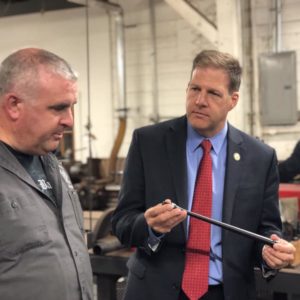In a great example of federalism (with a small “f”), governors have taken the lead role in striking the balance between safety and economic survival. Gov. Chris Sununu, in particular, has done a superb job thus far.
Sununu’s decisions have been based on the realities we face here in New Hampshire rather than, say, New York City. While New York is newsworthy, it is not where we live and work.
The governor appears to keep one ear open to what New Hampshire businesses tell him, while keeping the other ear tethered to what his medical team tells him. For example, he’s signed executive orders allowing curbside pickup of retail products, and suspending the payment of interest on real estate tax estates.
Another smart compromise is Emergency Order 23 to “keep New Hampshire construction projects, vital to the economy, active and progressing during these extraordinary times.”
The order allows for continued construction without a permit or inspection, but requires the developer to obtain inspections and documentation after the municipality reopens. It’s a smart compromise that will keep more Granite Staters working.
First, contractors must submit all permit applications and inspection requests to the “Building Official via first class mail, drop box — if provided — or by electronic submission such as email where available.”
Second, contractors must keep a record of attempts to communicate with local officials, and should keep a record of all attempts to comply with whatever new procedures the municipality offers.
Third, if a municipality is not able, or refuses, to issue a permit due to these limited operations within the timeframes otherwise provided by RSA 676:13,III (30 or 60 days – check the statute), Sununu’s order allows the contractor to continue construction without a permit or inspection, 10 days prior to written notice to the Building Official.
Fourth, if construction inspection is refused or cannot be offered within five working days, construction may continue pursuant to issued permits after the contractor documents completed work and materials using photographic and/or video methods to preserve evidence for subsequent review.
Finally, once a municipality resumes operations, a contractor must provide updates on the status of commenced or progressed construction, and obtain after-the-fact inspections and/or documentation of the same.
The municipality still may take any steps necessary to ensure compliance with building codes and, in continuing construction, the contractor assumes the risk that changes will have to be made to remain compliant.
Emergency Order 23 does not replace the need for proper inspections and documentation after the municipality resumes normal operations and has provided guidance on the additional documentation needed to take advantage of the ability to proceed without a properly issued permit.
Navigating our state through an unexpected crisis comes with the job of being governor, and one never knows how an elected official will respond to a crisis.
New Hampshire residents can be grateful for the rational approach thus far taken by Gov. Sununu.



